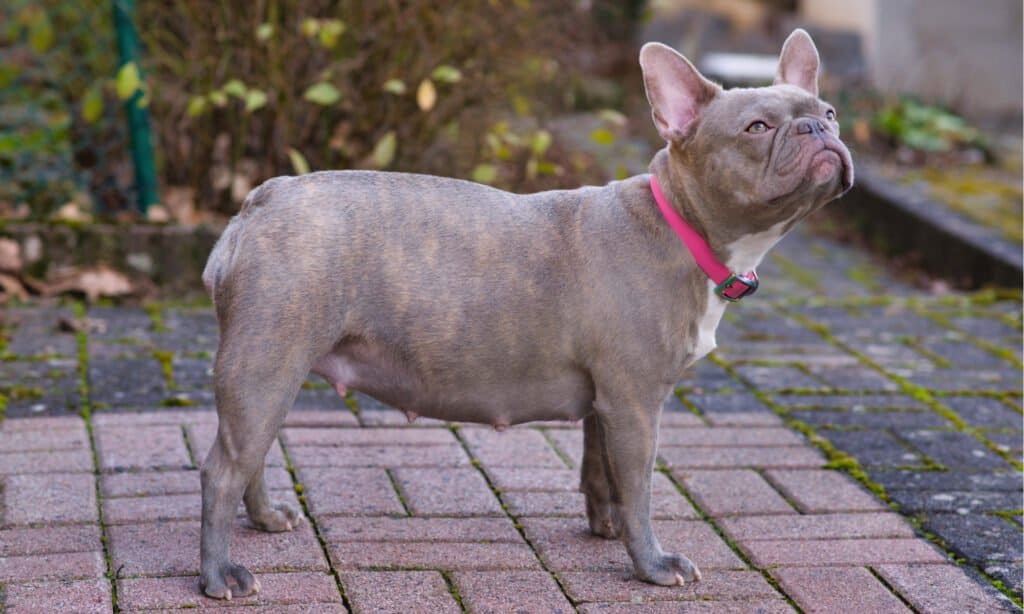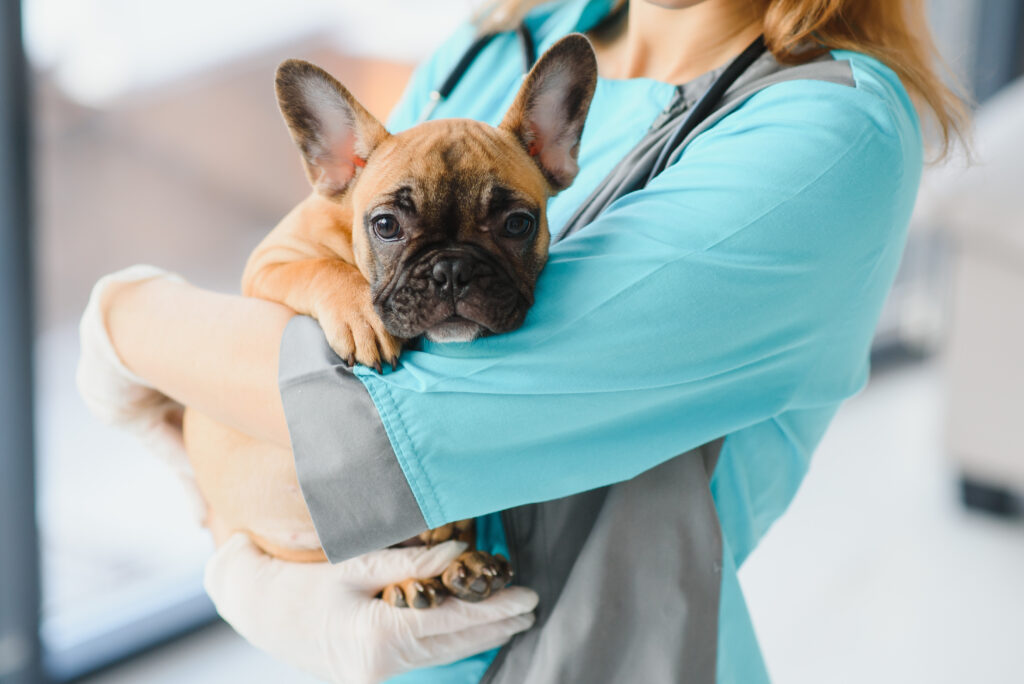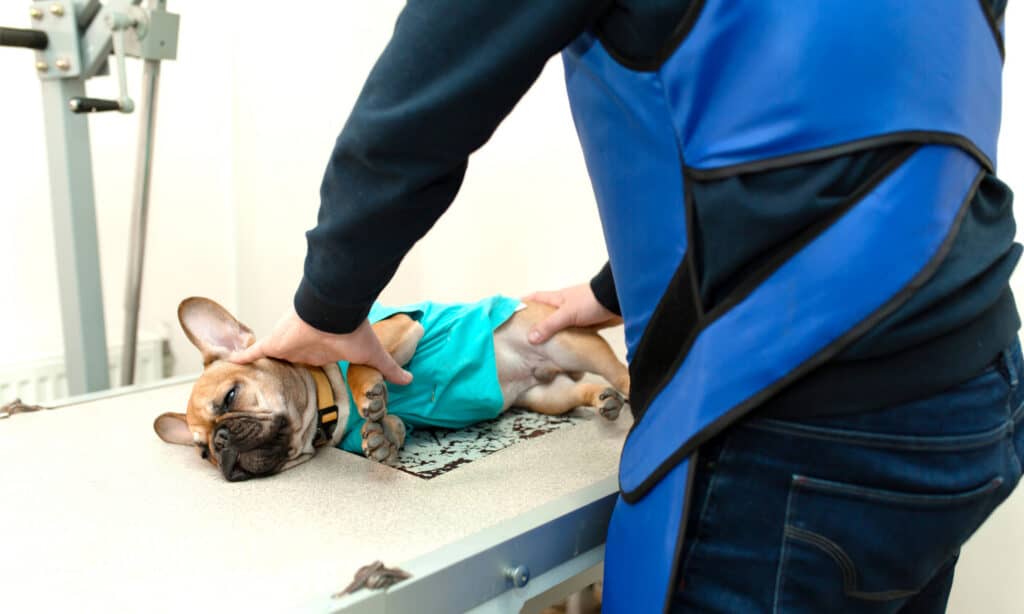The small but mighty French bulldog, or “Frenchie,” has become a favorite of many — so much so that it usurped the Labrador Retriever’s #1 spot since 1991 on the American Kennel Club’s Most Popular Dog Breeds in America list. French bulldogs are playful, smart, adaptable creatures with a longer-than-average life span (10 to 12 years) and a deep affection for their family and other loved ones.

Frenchies come in many colors, including the “tiger” brindle coloring.
©Meriluxa/Shutterstock.com
With such a high demand for these smush-faced pups, it’s no wonder breeding them is growing in popularity, too. However, it’s important to know the safety precautions for French bulldog pregnancies, as this breed has some intricacies when compared to others. Because purebred breeding often happens by artificial insemination, it’s important to know pregnancy symptoms for a female Frenchie that was impregnated by another dog.
Learn more about French bulldog pregnancy — from symptoms to gestation to delivery — below.
Pregnancy Symptoms
If you think your female Frencie might be pregnant, consider a few things.
- Is she less energetic and/or gaining more weight on the same food and treat diet she normally has?
- Has she had a difference in appetite?
- Do you see or notice a pink discharge from her?
- Are her nipples more enlarged or sensitive than normal?
- Is she throwing up in the morning?
- Has she been searching for a comfy and soft place to rest more than usual?
- Is her belly swollen, or getting larger?
While it’s essential to consult a veterinarian to confirm pregnancy, you can confidently hold the suspicion that your French bulldog is pregnant if you answered yes to at least a few of the questions above.
Gestation Period: How Long Are French Bulldogs Pregnant?

Female French bulldogs won’t start “showing” until later in their pregnancy.
©Firn/Shutterstock.com
Female Frenchies have a pretty normal gestation period for dogs — anywhere between 58 and 68 days. Labor should not happen before 58 days; if it does, rush your pup to the vet to ensure her and the puppies’ safety. On average, French bulldog gestation (from conception to birth) takes about 63 days in total. Like other dogs, this gestation period remains accelerated.
Inside the womb, puppies must mature fast to keep up with the quick gestation schedule. At just over two months of pregnancy, the trimesters of a Frenchie pregnancy take only several weeks each. The majority of growth and maturation for the litter of puppies occurs within the second month, but every day of the pregnancy holds importance for ensuring a safe, comfortable delivery.
Pregnancy Care for French Bulldogs

When breeding Frenchies, it’s important to know how to care for your pregnant female.
©iStock.com/yhelfman
Pregnancy care remains essential for a healthy gestational period and safe delivery. When your female Frenchie becomes pregnant, prioritize the following pregnancy care methods:
Vet Visits
With the changes happening to your Frenchie’s body, vet visits remain important to a smooth pregnancy and delivery. Consider taking your Frenchie to the vet a few weeks after insemination for a prenatal checkup. If you’re unsure whether or not your Frenchie is pregnant, the vet can run tests to confirm or deny their status.
When pregnancy is confirmed, the vet will inform you how often you should visit with your Frenchie — and if they need any tests done to ensure their health.
Diet
Just like humans, pregnant Frenchies will need to eat more and have special vitamins to ensure they’re not losing out on the nutrients meant for themselves to the pups they’re growing. The pups need food, too, so ensure you’re feeding the mama enough for both her and her litter.
When it comes to choosing food, veterinarians and expert breeders suggest feeding your Frenchie puppy food meant for small breeds. That’s right — puppy food generally has more proteins, fats, vitamins, and minerals; all of which will give your pregnant Frenchie the energy she needs to stay strong through her pregnancy. You can stick with her regular food if you prefer, but make sure to give 10% more and keep an eye on her vitals with the vet to ensure proper gestational progress.
Outside of pregnancy, many pet parents choose to give their dogs two larger meals a day, often coinciding with when they’re home from work. When a Frenchie female is pregnant, she has less stomach space for a big meal. As such, it’s a great option to help her feed or graze throughout the day. This ensures she gets the nutrients she needs without stressing her body or the litter.
Water plays a crucial role in pregnancy as well. Make sure you hydrate her food and always have fresh water handy if your Frenchie’s pregnancy coincides with hot summer months.
Exercise
You can keep your Frenchie’s activity level the same as usual, or even lessen it a bit based on how she’s handling her pregnancy. Never force or drag your Frenchie into a long walk, especially on a hot day. Listen to and respect your Frenchie; they’re simply listening to what their body needs.
Average Litter Size for French Bulldogs

French bulldog litters usually have four or fewer pups.
©iStock.com/Celiaaa
While most dogs have medium to large litters, French bulldog litters cap at four pups, with the majority of litters between just two to four Frenchies per pregnancy.
Like other small dogs, the Frenchie female’s anatomy just doesn’t have the room for a large litter of puppies that she can deliver safely. Her dam, as well as her hips and overall body, are small and usually under 30 pounds.
It’s important to stay in tune with your female Frenchie’s health throughout the pregnancy to give the pups the best chance to survive. Even in small litters, not every pup is guaranteed to survive and may even be stillborn.
French Bulldog Pregnancy by Week

Having a team of professionals at your back will help your Frenchie’s pregnancy run smoothly.
©Hryshchyshen Serhii/Shutterstock.com
What to Expect in Week 1
If you didn’t already know, Frenchies can’t mate in the traditional way. Based on the breed’s characteristics — which have been selectively bred into them by humans for generations — the male often has trouble mounting the female. As such, many breeders opt for artificial insemination when looking for their pup(s) to conceive to create a purebred litter.
Once the female has been successfully fertilized, small changes will start to occur. She may get morning sickness, but it usually won’t kick in until weeks three and four. In the first week, you also may see some pink discharge from her. That’s about the extent of physical changes in the first week, as most of this stage is the internal fertilization of the eggs. If your female French bulldog acts unnaturally or has a major shift in behavior, consult your veterinarian.
What to Expect in Week 2
By this time, the fertilized eggs have moved into the uterus and have begun early embryonic development. You can play with, interact, and feed your pup as normal this second week as well, and only consult your veterinarian if, again, your Frenchie acts wildly out of the ordinary.
As an objective for yourself, monitor your female Frenchie’s diet. Is she eating more or less? Does she seem hungry or completely disinterested in food? As the eggs start to grow, she’ll need the energy food provides. Unless directed by the vet, don’t overfeed your Frenchie this week. The embryos, while growing, should be zapping much energy from the mother, and significant (over 10%) body weight addition before Week 6 can spell trouble for the pregnancy and birth.
What to Expect in Week 3
No need for changes to diet and exercise this week, either, as we start to close on the first trimester. However, changes are happening inside the female Frenchie: the embryos have begun organ development and growth! They’re still tiny — less than one centimeter in length — but have turned into fetuses.
The process happening this week is called nidation. Not only is the female officially pregnant with growing fetuses; the body has created a membrane around the fetuses to ensure a proper transport of nutrients to their growing bodies.
If your Frenchie hasn’t had morning sickness yet, it may start this week — if at all.
What to Expect in Week 4
Week four of your Frenchie’s pregnancy remains one of the most important. This is the time to start limiting movement, increasing food, and monitoring the overall health and comfort of your female French bulldog. If your pup starts to have swollen nipples or emit a clear discharge from her vagina, it’s perfectly normal.
In this stage, the fetuses will continue to develop — even to the point where your vet may be able to feel them through your Frenchie’s belly. No longer one centimeter long, the fetuses are developing facial structures and spines. She will most likely have an increased appetite to offset the growing her puppies are doing, and after consulting with a vet, you can increase the food you’re giving.
What to Expect in Week 5
If you haven’t already taken your pup to the vet for a prenatal appointment, make sure you go this week. The pups have developed significantly over the last seven to nine days and now have claws, whiskers, and sex organs.
This week, the vet will be able to detect the pregnancy through an ultrasound and let you know how many pups to expect. Again, if you haven’t consulted your vet up until this point about diet, now is the time to assess how your Frenchie is faring and if she needs additional nutrients to keep up her strength.
What to Expect in Week 6
Get ready for a turning point for your Frenchie and her pups — the fetuses will start to move and your Frenchie no longer looks like a normal pup; her belly will grow bigger and bigger by the day!
Your female French bulldog will start her nesting phase soon, so now is the perfect time to prep her birthing area. Often referred to as a whelping box, this area needs to be comfy so she looks forward to staying there and remains comfortable. The sides should be low enough for her to see and walk over, with cutouts so she can leave and enter at her discretion.
Feed your Frenchie all the food she can stomach at this point. If she’s been eating two large meals, allow her to eat throughout the day. Gaining a bit more weight is no longer a concern.
What to Expect in Week 7
This is the last week your Frenchie will be preparing, as birth can (and sometimes does!) happen after week seven. The fetuses your female Frenchie is growing are almost fully developed now; they even have hair and unique markings. It’s important to finish preparing for your pup’s whelping and nesting behavior by the end of this week.
You’ll also notice your female losing some hair; this is a normal response and simply the body’s way of preparing for birth. She’s shedding the hair on her stomach to ensure her puppies can reach and drink from her nipples. If you’ve changed her diet to add in puppy food, you can transfer her back to her regular food completely — but make sure she has more than usual to satisfy any craving or hunger she has. If she doesn’t eat much, she’s most likely very uncomfortable from the pregnancy, but keep an eye out and have your vet on standby in case the hunger strike lasts for a few days and she starts to lose weight.
What to Expect in Weeks 8 and 9
Your pup is ready to pop any day now!
Between weeks eight and nine, make the final preparations for birth and watch for signs of imminent labor. The most important thing to do is make your Frenchie feel comfortable and relaxed. During this time, you may be able to see the pups move around in your French bulldog’s belly if she’s still enough.
How to Prepare for Labor and Delivery

Make sure you and your vet have a good plan for your Frenchie’s labor.
©iStock.com/Kateryna Kukota
Consult your vet on how best to handle the labor and delivery of your French bulldog’s puppies. Similar to why Frenchies have trouble mating naturally, a natural birth can be dangerous for a French bulldog because of its small, narrow hips and the puppy’s large head.
Your veterinarian will offer the best advice on whether your pup can give a vaginal birth or need a C-section. In most cases, your pup will receive a C-section to deliver her litter. It’s the most common form of birth for Frenchies, and also the safest. An estimated 80% of pregnant Frenchies give birth via C-section.
If your vet has deemed your Frenchie able to have a natural birth, her whelping box should be set up to her liking and she should feel at home. Take her temperature often to predict when she may go into labor. She also may start pacing or digging when it’s time. Make sure to give her space and don’t crowd her as she prepares.
How to Care For Your French Bulldog Afterward

Mama Frenchie should get lots of rest to recover her strength after labor and delivery.
©VDB Photos/Shutterstock.com
After labor completes, your dog is finally able to rest and become comfortable again.
Immediately after labor, let the mom rest, use the bathroom, and get cleaned up. Don’t bathe her right away or allow other dogs or animals in the house near the whelping box. Let your female Frenchie parent her pups and set the routine, with you acting as backup to her whenever she needs it.
Ensure she has enough food and water to get her strength back, and show her lots of love and affection for a job well done. If she has a C-section, keep an eye on the wound, limit movements, and follow the veterinarian’s instructions for proper care.
Setting Pups Up for a Bright Future

Setting Frenchie puppies up for a bright future starts at conception.
©Firn/Shutterstock.com
Having a new litter of puppies is always exciting, and baby French bulldog Puppies are no exception. These sweet, cute, heart-melting little bundles of joy need their mom for the first few weeks of life to grow up strong, so ensure both you and your female Frenchie get the rest and nutrients you need to care for these fledging babies after your French bulldog’s pregnancy.
If you’re planning to breed your female Frenchie more than once, it’s responsible to only breed them three times with at least 18 months in between pregnancies. With such small bodies, you’ll want to give her a break before she has to carry another litter.
The photo featured at the top of this post is © dezy/Shutterstock.com
Ready to discover the top 10 cutest dog breeds in the entire world?
How about the fastest dogs, the largest dogs and those that are -- quite frankly -- just the kindest dogs on the planet? Each day, AZ Animals sends out lists just like this to our thousands of email subscribers. And the best part? It's FREE. Join today by entering your email below.
Thank you for reading! Have some feedback for us? Contact the AZ Animals editorial team.






